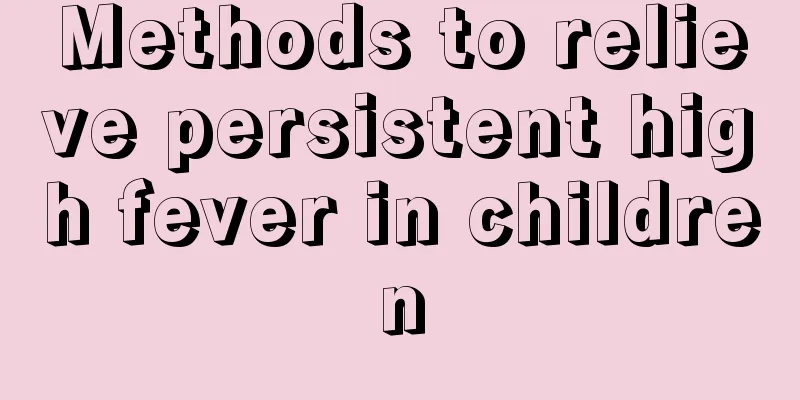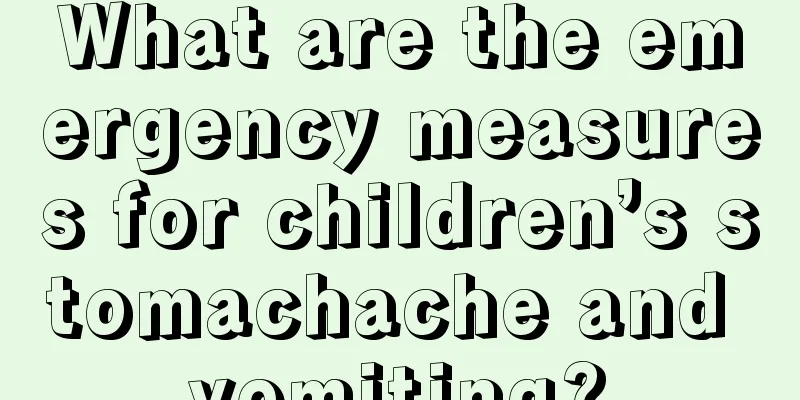Baby coughs and runny nose after fever subsides

|
If the baby has fever symptoms, parents must not ignore it, because fever symptoms are a more serious form of cold and if ignored, it can easily cause some brain nerve damage. However, some parents find that their babies still have runny nose and cough after the fever subsides. When babies have a cough and a runny nose, mothers need to take a different approach than adults. So what should we do at this time? Respiratory diseases are common among young children, and cough is the most common symptom in young children. When a child coughs, the mother can take different approaches according to different conditions. The cough is short and mild: If the child's cough is mild, does not affect his diet and sleep, and he is active and in good spirits as usual, then the mother does not need to worry. The child may just have a cold. If he gets more rest and drinks more water, he will generally recover naturally in 3 to 5 days. If the cough lasts for more than a week and is frequent, or even accompanied by a high fever, the child should be taken to the hospital to find out the cause and prescribe the right medicine. The following methods can help children enhance their immunity and stay away from coughing. 1. Reasonable nutrition: If children in the growth and development stage lack certain nutrients, such as calcium, iron, zinc, and vitamins, their immunity will decline. Therefore, we should pay attention to giving our children balanced nutrition. 2. Exercise regularly: Appropriate exercise can improve body function, enhance children's cardiopulmonary metabolic capacity, and improve children's ability to adapt to the environment. Starting from the cool autumn, children should be dressed lightly, allowed to do more outdoor activities, and breathe fresh air, so that they can gradually adapt to the cold environment and improve their ability to resist the cold. 3. Pay attention to the cleanliness of the environment: the child’s room should be ventilated every day. If parents have respiratory infections, they should minimize contact with the child. My baby keeps coughing. What should I eat? 1. Eat more fresh fruits and vegetables You can give your children more fresh vegetables and fruits to supplement enough inorganic salts and vitamins. You can also consume more fruits and vegetables containing carotene, such as tomatoes, carrots and other foods rich in vitamin A. 2. Drink enough water Give babies who have a cough enough boiled water to drink, because sufficient water not only meets the baby's physiological metabolic needs, but also helps dilute sputum, helping the baby to cough up sputum. 3. Add medicinal ingredients In your daily diet, you can appropriately choose some ingredients that can be used as both medicine and food, such as lily, white fungus, lotus root, pear, almond, lotus seed, ginkgo, water chestnut, etc. There is nothing wrong with using cough suppressants to treat children's coughs. For children, treating coughs, but taking too many medicines will not only reduce the child's immunity, but also cause the baby's appetite to worsen, which will also affect their health. Diet therapy is the safest and healthiest method. Diet therapy for children's cough Lily honey (specially for cough) Ingredients: 60 grams of lily and 30 grams of honey. Preparation and administration: Wash and dry the lilies, mix well with honey, and steam them in a pot. This honey-cooked lily can be used as a snack for babies. Indications and functions: Lily tastes sweet and slightly bitter, and is slightly cold in nature. It has the effects of moistening the lungs and relieving cough, clearing the heart and calming the nerves. Contains starch, protein, fat, various alkalis, calcium, phosphorus, iron and other ingredients. Pharmacological tests have shown that its decoction has an antitussive effect on children's cough caused by ammonia, and can counteract toad spider asthma caused by histamine. Use with honey to enhance its lung-moistening and cough-relieving effects. It is suitable for treating chronic bronchitis in infants, dry cough in the throat, especially dry cough after the beginning of autumn, accompanied by constipation. Note: It is not suitable for infants with spleen deficiency and loose stools. This method is easy to take and is suitable for use in autumn and winter. |
<<: Baby's runny nose in summer
>>: What to do if your 3-year-old child has a runny nose
Recommend
Diagnosis and treatment of chlamydia infection in babies
If a baby is infected with chlamydia, it will ser...
ADHD Consequences
I believe that if a parent finds out that his or ...
What to do if your 10-month-old baby has a runny nose
Ten-month-old babies must be taken care of compre...
Can babies eat barley porridge?
Red bean and barley porridge is a very common por...
Can children’s indigestion be cured by taking medicine? How to deal with it?
Children have no resistance to delicious food, th...
What should I do if my child has recurring diarrhea?
Diarrhea in young children can be divided into mi...
What should I do if my 3-year-old child drools?
When the baby is four months old, as a family mem...
What should I do if my baby keeps hiccuping at one month old?
In fact, when the baby is just born, he is the tr...
What to do if your baby has a persistent high fever
High fever in babies is a particularly frequent p...
What should I do if my baby has anorexia in summer? Five ways to solve anorexia
In summer, young children will suffer from anorex...
One-year-old baby development indicators
We all know that the developmental indicators of ...
How to treat synovitis of the knee in children?
Children are little angels given by God to their ...
How to treat oral ulcers in three-year-old babies
Babies are too young to brush their teeth as freq...
Should children be spanked if they don't listen?
Many parents have their own opinions on whether c...
How to educate a 4-year-old child
Children are naughty by nature and are not bound ...









